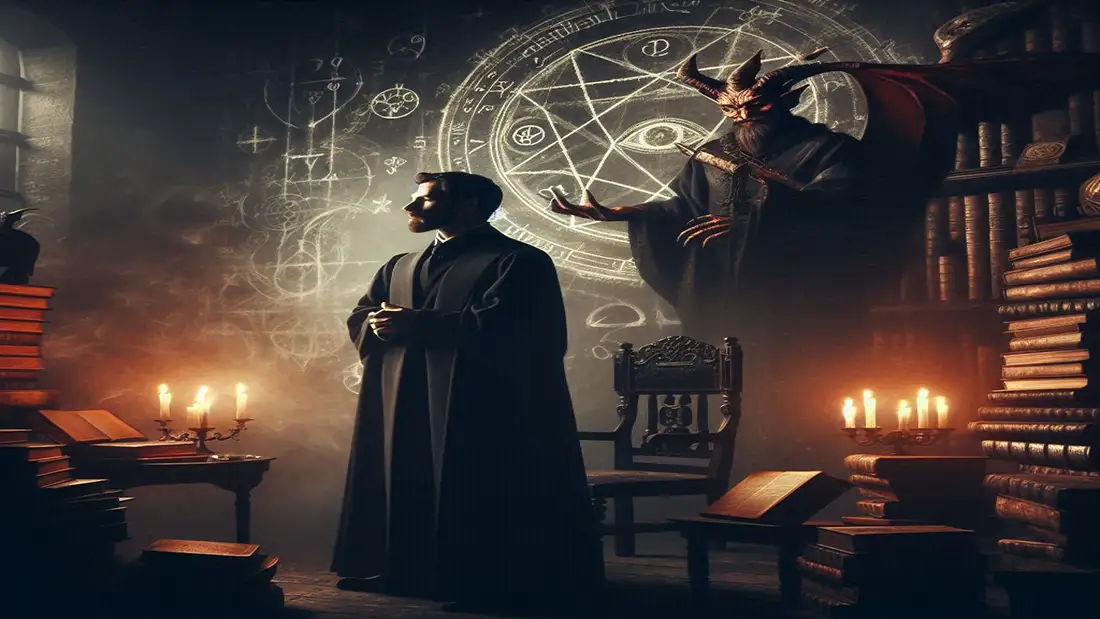In the world of literature, few works delve as deeply into the complexities of human ambition, pride, and faith as Christopher Marlowe’s Doctor Faustus. As one of the most prominent plays of the Elizabethan era, Doctor Faustus explores themes that continue to resonate with audiences today, particularly the destructive consequences of rejecting divine authority. One of the most striking aspects of Faustus’ character is his atheism, a belief system that leads him down a dangerous path. In this blog post on BD JOBZ PREPARATION, we will explore the theme of atheism in Doctor Faustus, examining how it shapes the protagonist’s actions and ultimately determines his tragic fate.
Read More: Theme of Doctor Faustus
Atheism in Doctor Faustus

In Christopher Marlowe’s play Doctor Faustus, one of the central themes is the exploration of human ambition, knowledge, and the consequences of forsaking faith. The protagonist, Doctor Faustus, is a scholar who grows disillusioned with the limitations of traditional knowledge and turns to darker, forbidden practices in pursuit of greater power. One of the key aspects of Faustus’ character is his atheism, which serves as a foundation for his pact with the devil. The theme of atheism in Doctor Faustus reflects not only Faustus’ personal rebellion but also critiques the society’s religious beliefs during the Elizabethan period. By examining the idea of atheism in the play, we gain a deeper understanding of the moral and philosophical undertones that Marlowe conveys.
The Meaning of Atheism in Doctor Faustus
Atheism in Doctor Faustus can be understood as the rejection of divine authority and religious doctrines. Faustus, dissatisfied with the theological and philosophical knowledge offered by Christianity, chooses to dismiss God and the afterlife. In his pursuit of infinite power and understanding, Faustus seeks knowledge beyond what is allowed by traditional teachings, rejecting not only the Church’s teachings but the very concept of a higher divine order. His atheism becomes the driving force behind his tragic journey, as he desires to transcend the human condition by embracing a form of knowledge that will allow him to control and manipulate the world around him.
Faustus’ rejection of God and religion is evident when he turns away from the study of theology. Initially, Faustus is portrayed as a brilliant scholar, excelling in various fields of knowledge. However, his increasing dissatisfaction with the limits of human understanding, particularly in religious matters, leads him to despair. Faustus, in his search for ultimate power, comes to the conclusion that the conventional study of religion is futile. In his famous soliloquy, he declares that he will no longer study the Bible, as it offers no answers to his thirst for limitless knowledge. This rejection of religious teachings is a key manifestation of atheism in Doctor Faustus.
Faustus’ Deal with the Devil: A Manifestation of Atheism
Faustus’ atheism in Doctor Faustus directly leads to his pact with Mephistophilis, the demon who serves Lucifer. In an act of defiance against the divine order, Faustus offers his soul in exchange for twenty-four years of magical powers. He seeks to control the forces of nature and acquire the knowledge that God, as he believes, has kept from him. His decision to make a pact with the devil is both a rejection of God’s mercy and a demonstration of his belief that the powers of the supernatural are within his grasp.
The moment Faustus signs the contract with his blood, he solidifies his belief in atheism by choosing a path that excludes the possibility of redemption. By invoking demonic forces and aligning himself with evil, Faustus rejects the Christian notion of salvation and turns away from God’s grace. Mephistophilis, who tries to persuade Faustus to repent, becomes a symbol of Faustus’ unwavering commitment to atheism. The fact that Faustus is not swayed by the warnings of the devils and angels who appear to him further underscores his determination to embrace atheism in Doctor Faustus.
The Consequences of Atheism in Doctor Faustus
The consequences of Faustus’ atheism become painfully clear as the play progresses. Although Faustus initially enjoys the fruits of his pact—magical powers, wealth, and fame—he soon realizes that his pursuit of power has come at an unimaginable cost. Despite his newfound abilities, Faustus finds no peace or satisfaction. He is haunted by the constant reminder of his damnation, unable to escape the knowledge that his soul is condemned for eternity. The refusal to acknowledge God and the rejection of repentance make it impossible for him to seek redemption.
One of the most tragic aspects of Faustus’ atheism is that he is given multiple opportunities to repent and save his soul, yet he refuses. Throughout the play, the Good Angel and Evil Angel both urge Faustus to reconsider his choices and seek forgiveness. However, Faustus remains indifferent to these pleas, dismissing the notion of salvation as irrelevant to his quest for power. His inability to repent, even when faced with the consequences of his actions, serves as a commentary on the dangers of atheism in Doctor Faustus. Marlowe suggests that denying divine authority and refusing to seek redemption ultimately leads to damnation and eternal suffering.
The Religious Context of Atheism in Doctor Faustus
To fully appreciate the theme of atheism in Doctor Faustus, it is important to consider the religious context of the Elizabethan period. In Marlowe’s time, England was undergoing significant religious turmoil. The Protestant Reformation had led to a break from the Catholic Church, and debates about religion and theology were widespread. In this environment, atheism was viewed as a dangerous and subversive belief, one that threatened the established social and moral order. Marlowe, through his portrayal of Faustus as a learned but ultimately flawed individual, critiques the dangers of excessive intellectual pride and the rejection of divine authority.
The depiction of Faustus as an atheist reflects Marlowe’s engagement with the intellectual currents of his time. The Renaissance period was marked by a renewed interest in humanism and the pursuit of knowledge, but Marlowe’s play warns against the dangers of overreaching ambition. Faustus represents the intellectuals of the time who sought knowledge and power beyond human limits. By portraying Faustus as an atheist who turns away from God in pursuit of forbidden knowledge, Marlowe critiques the potential consequences of an unchecked intellectual and philosophical ambition that ignores the spiritual and moral dimensions of life.
The Tragic Nature of Atheism in Doctor Faustus
Atheism in Doctor Faustus is not merely a philosophical stance but also a tragic flaw that leads to the protagonist’s downfall. Faustus’ pride and his refusal to acknowledge any higher authority ultimately destroy him. The play presents a clear moral lesson: to reject God and the possibility of redemption is to choose damnation. While Faustus is an incredibly intelligent and gifted scholar, his rejection of the divine order and his embrace of atheism blinds him to the true meaning of life and the potential for spiritual growth. His tragic end serves as a cautionary tale about the dangers of intellectual hubris and the refusal to seek spiritual salvation.
The theme of atheism in Doctor Faustus is a powerful critique of human ambition, the search for knowledge, and the consequences of turning away from God. Faustus’ rejection of divine authority and his pursuit of forbidden knowledge lead him down a path of despair and damnation. The play highlights the dangers of excessive pride and intellectual arrogance, warning against the temptation to forsake faith in the quest for power. Through the character of Faustus, Marlowe explores the tragic consequences of atheism, offering a timeless commentary on the human condition.
Read More: Autobiographical Notes in Doctor Faustus
The theme of atheism in Doctor Faustus serves as a powerful commentary on the dangers of forsaking faith in the pursuit of power. Through Faustus’ tragic journey, Marlowe highlights the consequences of intellectual arrogance and the rejection of divine guidance. The play reminds us of the importance of humility and the dangers that come with an unchecked desire for knowledge. As we reflect on the moral lessons from Doctor Faustus, we are reminded that faith and redemption remain central to the human experience, a theme that continues to be relevant in today’s world. This exploration of atheism in Doctor Faustus is just one of the many insightful topics you can find on BD JOBZ PREPARATION, where we discuss various literary themes and their significance.



